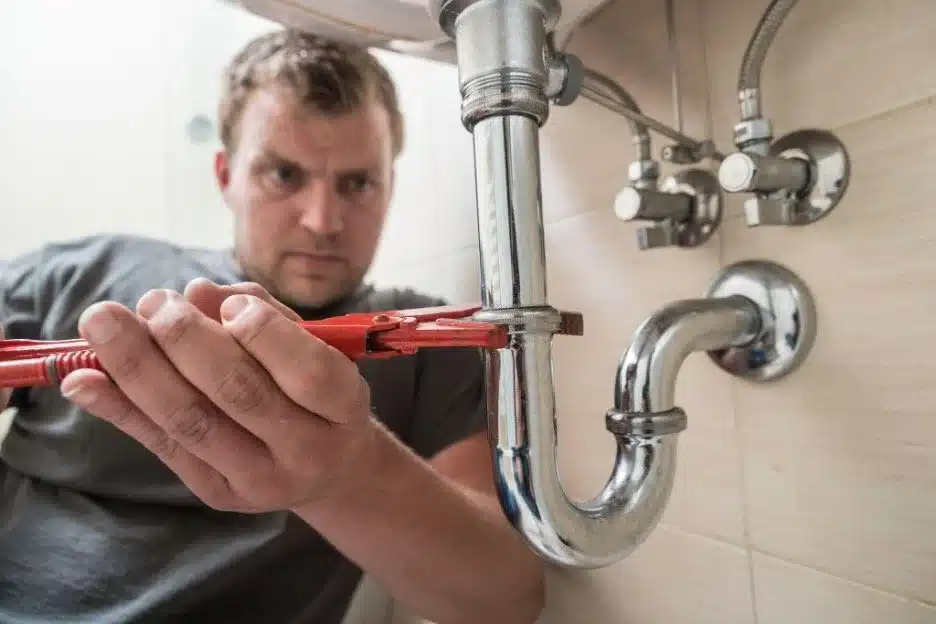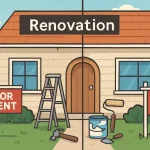The desire for independence often encourages people to attempt DIY plumbing. Tasks such as tightening a faucet or replacing a washer may look simple, but can be misleading. Plumbing involves complex systems hidden within walls, floors, and ceilings that typically need professional attention from a plumbing contractor. Here are the pros and cons of DIY plumbing:
Causing Serious Water Damage
When attempting plumbing repairs without training, mistakes can easily result in costly water damage. Something as minor as over-tightening a joint may cause leaks that remain unnoticed. Water seeping into walls or floors weakens structures over time. Many people underestimate the risks of hidden leaks, particularly behind sinks or inside cabinets.
A leaking pipe beneath a bathroom vanity can eventually damage wooden flooring. Persistent moisture also creates an environment that fosters mold growth, introducing health concerns and necessitating expensive remediation. If a professional plumbing contractor does not address leaks, they may spread into basements or crawl spaces, making cleanup more difficult.
Lacking Proper Plumbing Tools
Plumbing often requires specialized tools that most DIY enthusiasts do not own. Jobs like tightening fittings or cutting pipes are harder and less precise without the correct equipment. Using substitutes, such as pliers instead of pipe wrenches, can damage materials and reduce effectiveness. Inadequate tools also hinder progress and may lead to subpar repairs.
A clogged pipe may need an auger rather than repeated plunging. Even basic tasks, such as replacing faucet washers, are faster and more effective with proper tools. Lacking the right equipment often leads to incomplete or temporary repairs that do not fully resolve the issue. Plumbing professionals carry the necessary equipment to fix a wide range of issues.
Relying on Temporary Fixes
DIY plumbing may result in short-term fixes instead of lasting solutions. Wrapping tape around a leaking pipe may slow the drip, but it will not resolve the underlying problem. While temporary measures provide brief relief, they often allow the same issue to resurface later, sometimes with greater damage.
Repeatedly patching leaks or clearing small blockages without addressing the root cause can weaken pipes and fixtures. Quick fixes also give a false sense of security, delaying the need for proper repairs. What begins as a slow drain can eventually become a complete blockage if left untreated.
Violating Plumbing Codes
Strict codes regulate various plumbing systems to provide safety, sanitation, and reliable performance. These codes may not be followed in DIY repairs, particularly when changing systems buried in walls or floors. Installing the wrong pipe size can create pressure problems or increase the risk of leaks. Other errors, such as improper connections between water supply and wastewater lines, may lead to contamination hazards within the home. Contractors are familiar with local regulations and take meticulous steps to comply with all applicable codes and requirements in your area.
Developing Useful Practical Skills
Smaller plumbing tasks will help people build practical skills and increase confidence in home maintenance. Replacing a worn-out faucet washer or tightening a loose shower head provides experience in solving everyday problems. Completing these projects successfully makes future repairs less intimidating and reduces reliance on professional services for minor issues. Many also find satisfaction in working hands-on, such as measuring, cutting, and fitting parts accurately.
Work With a Plumbing Contractor
Although small projects can be educational, DIY plumbing carries risks that are easy to overlook. Secret leaks, structural damage, or code violations can occur. Due to the lack of specialized tools, repairs may be incomplete or less effective than desired. Short-term solutions often result in a pattern of ongoing problems. Contact a licensed plumbing contractor for assistance with any plumbing issues.







